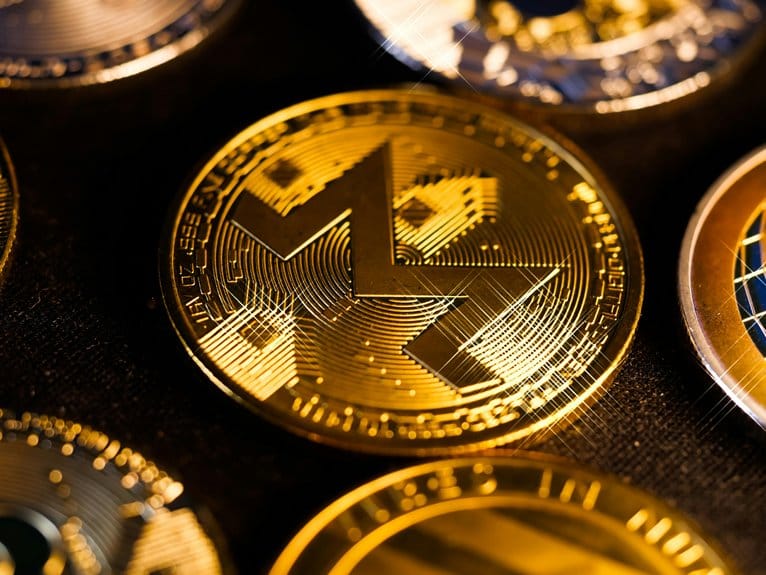Sports and gaming tokens serve as digital assets within blockchain ecosystems, facilitating value exchange and enhanced fan engagement. These tokens generated over $8.4 billion in transactions during 2023, demonstrating significant market adoption. They enable direct interaction between fans and teams while automating revenue distribution through smart contracts, with 25% typically allocated to participant incentives. The technology supports sophisticated loyalty programs, resulting in 40-60% higher retention rates and creating new sponsorship opportunities. Enhanced by layer-2 solutions and improved scalability, the ecosystem continues to evolve with institutional investors increasingly viewing these tokens as viable alternative assets. The intersection of blockchain innovation and digital entertainment presents compelling opportunities for deeper market exploration.
Understanding Sports and Gaming Tokens
Sports and gaming tokens represent digital assets built on blockchain technology that enable new forms of engagement, ownership, and value exchange within athletic and gaming ecosystems. These tokens serve multiple functions, from facilitating transaction efficiency in virtual marketplaces to establishing decentralized funding mechanisms for teams and game developers.
The token utility extends beyond simple transactions, incorporating features like digital collectibles, governance rights, and exclusive access to events or content.
Through ecosystem integration, these tokens create interconnected networks where participants can engage in various activities while maintaining verifiable asset ownership. This infrastructure supports sophisticated loyalty programs that reward users based on their participation and investment in the platform.
Player rewards are typically structured to incentivize long-term engagement and community building, fostering sustainable economic models within these digital environments.
The implementation of blockchain-based tokens has revolutionized how value is created and distributed in sports and gaming sectors. By enabling direct peer-to-peer transactions and transparent ownership records, these tokens eliminate traditional intermediaries while creating new opportunities for monetization and engagement.
This technological framework provides the foundation for evolving digital economies that blend entertainment, competition, and financial opportunities.
Fan Engagement Through Digital Assets
Digital assets have transformed traditional fan experiences by creating unprecedented opportunities for direct interaction with teams, athletes, and gaming communities. Through blockchain-enabled platforms, organizations can now implement sophisticated fan loyalty programs that reward engagement with exclusive content and digital collectibles. These assets serve as both memorabilia and functional tokens within ecosystem-specific reward systems.
Interactive experiences powered by digital assets enable fans to participate in decision-making processes, from team merchandise designs to gameplay strategies. Data shows that communities implementing these engagement tools experience 40-60% higher retention rates compared to traditional fan clubs.
The integration of social engagement features with digital asset ownership has created new sponsorship opportunities, allowing brands to connect with highly engaged audiences through authenticated digital experiences.
Community building through digital asset ownership has evolved beyond simple collectibles into dynamic ecosystems where fans can trade, showcase, and utilize their tokens across multiple platforms. These systems typically incorporate tiered access levels, where increased participation unlocks additional benefits, driving sustained engagement.
The result is a more immersive and measurable fan experience that generates valuable data insights while fostering stronger connections between stakeholders.
Revenue Models and Monetization
Blockchain-based revenue models in sports and gaming have evolved into sophisticated monetization frameworks, generating an estimated $3.2 billion in token-based transactions during 2022. The primary revenue streams emerge through strategic token distribution models, where platforms implement tiered systems for both initial sales and secondary markets trading.
These frameworks typically allocate 40-60% of tokens for community distribution, while reserving portions for ecosystem sustainability and development.
Revenue sharing mechanisms have transformed traditional sponsorship opportunities, enabling direct-to-fan engagement through tokenized assets. Teams and gaming platforms now leverage smart contracts to automate profit distribution, with an average of 25% of revenues channeled back to active participants through player incentives and loyalty programs.
Crowdfunding mechanisms have emerged as a vital component, allowing communities to participate in project development while securing early access to digital assets.
The integration of secondary markets has proven crucial for long-term value retention, with data indicating a 300% increase in trading volume for rare digital collectibles in 2022.
This market depth supports ecosystem sustainability through transaction fees and creates additional revenue streams for rights holders, while maintaining asset liquidity for participants.
Virtual Economies in Blockchain Gaming
Virtual economies within gaming ecosystems have generated over $8.4 billion in tokenized transactions during 2023, fundamentally reshaping player-driven markets through decentralized asset ownership. The integration of blockchain technology enables transparent virtual asset trading mechanisms where players maintain verifiable ownership of in-game items, characters, and digital land through non-fungible tokens (NFTs).
These blockchain-based virtual economies operate on programmable smart contracts that automate market dynamics, revenue distribution, and asset verification. Player ownership extends beyond traditional gaming paradigms, allowing users to monetize their gaming achievements and transfer assets across compatible platforms.
Analysis shows that successful blockchain games maintain equilibrium between asset scarcity and utility, with high-value virtual items typically representing either competitive advantages or aesthetic significance.
The emergence of cross-game interoperability protocols further amplifies the economic potential of virtual assets, enabling players to leverage their digital holdings across multiple gaming environments. This interconnected ecosystem has resulted in sophisticated trading mechanisms, including fractional ownership models and automated market makers specifically designed for gaming tokens, creating sustainable economic loops within virtual worlds.
Team Management and Governance
Effective team management and decentralized governance models have become instrumental in shaping the success of sports and gaming token ecosystems. Through carefully structured token distribution mechanisms, projects establish frameworks that align stakeholder interests while maintaining ecosystem sustainability.
These systems typically implement community voting protocols that enable token holders to participate in critical decision-making processes. Governance models in sports and gaming tokens often incorporate multi-layered decision making frameworks, where different stakeholder groups hold varying levels of voting power based on their token holdings or platform engagement.
Player incentives are typically integrated into these structures, rewarding both performance and long-term commitment to the ecosystem. Transparency mechanisms, such as on-chain voting records and real-time token allocation tracking, ensure accountability and build trust among participants.
Stakeholder engagement is further enhanced through specialized committees and working groups that focus on specific aspects of ecosystem development. These bodies often utilize hybrid governance approaches, combining automated smart contract execution with human oversight to optimize resource allocation and strategic planning.
This balanced approach helps maintain operational efficiency while fostering community-driven growth and adaptation to market demands.
Market Dynamics and Token Value
The multifaceted market dynamics of sports and gaming tokens exhibit distinctive patterns influenced by both traditional asset behavior and unique ecosystem-specific factors.
Token liquidity varies significantly based on platform adoption rates, trading volume, and market depth, while market volatility often correlates with major sporting events, tournament outcomes, and gaming milestone achievements.
Investor sentiment in this sector is particularly responsive to technological advancements, such as improved blockchain scalability solutions and enhanced gaming mechanics.
The competitive landscape continues to evolve as new projects enter the market, affecting token values through supply-demand mechanics and ecosystem sustainability metrics. Token utility plays a crucial role in value retention, with successful projects demonstrating clear use cases within their respective platforms.
Regulatory impact remains a significant market driver, as jurisdictional clarity regarding digital assets influences institutional participation and cross-border trading volumes.
Projects that maintain robust compliance frameworks while innovating within regulatory boundaries typically demonstrate more stable token valuations.
The interplay between these factors creates a complex market environment where price discovery mechanisms reflect both speculative trading activity and fundamental platform growth metrics.
Future Growth and Adoption Trends
Rapidly evolving technological capabilities and increasing mainstream acceptance suggest substantial growth potential for sports and gaming tokens in blockchain ecosystems.
As technological advancements continue to enhance blockchain scalability and user experience, industry analysts project significant expansion in token adoption across virtual sports platforms, fantasy leagues, and competitive gaming environments.
The competitive landscape is becoming increasingly sophisticated, with established sports franchises and gaming companies developing proprietary tokens.
Market research indicates shifting user demographics, with millennials and Gen-Z driving adoption through their dual interest in cryptocurrencies and digital entertainment.
However, regulatory challenges remain a critical factor, as jurisdictions worldwide grapple with classifying and governing these digital assets.
Investment opportunities in the sector are expected to diversify, with institutional investors showing heightened interest in sports and gaming tokens as alternative assets.
Security concerns continue to shape development priorities, with enhanced protocols and smart contract auditing becoming industry standards.
The integration of layer-2 solutions and improved interoperability between blockchain networks is likely to accelerate adoption rates, potentially leading to a more consolidated and mature market by 2025.
Frequently Asked Questions
How Do Sports Teams Protect Against Token-Based Match-Fixing Schemes?
Sports teams implement robust match fixing prevention protocols through token security measures, including transaction monitoring, smart contract audits, wallet restrictions, and collaboration with regulatory bodies to detect suspicious activities.
Can Traditional Sports Betting Platforms Integrate With Blockchain Gaming Tokens?
Traditional betting platforms can integrate with decentralized platforms through API protocols, enabling seamless token transactions and enhanced user engagement while maintaining regulatory compliance and secure settlement mechanisms.
What Happens to Token Value When Star Players Leave Teams?
Player departures typically trigger negative token price volatility, influenced by player market dynamics. However, robust fan engagement strategies and team performance can mitigate long-term value impact through sustained community support.
How Do Gaming Tokens Handle Cross-Border Regulatory Compliance Issues?
Gaming tokens navigate cross-border transactions through multi-jurisdictional regulatory frameworks, implementing compliance protocols that align with international standards while addressing regional gaming regulations through automated verification and reporting systems.
Do Professional Athletes Receive Compensation in Team-Specific Crypto Tokens?
Some professional athletes receive cryptocurrency compensation through team tokens and athlete endorsements, though adoption remains limited due to token liquidity concerns and varying contractual regulations across sports leagues.
Conclusion
Sports and gaming tokens represent a transformative force in blockchain ecosystems, driving innovation in fan engagement, virtual economies, and decentralized governance. The convergence of traditional sports, gaming mechanics, and digital assets creates sustainable revenue models while establishing new paradigms for value creation. As market adoption accelerates and technology matures, these tokens are positioned to revolutionize entertainment industries through enhanced user experiences, democratic participation, and interconnected virtual economies.





